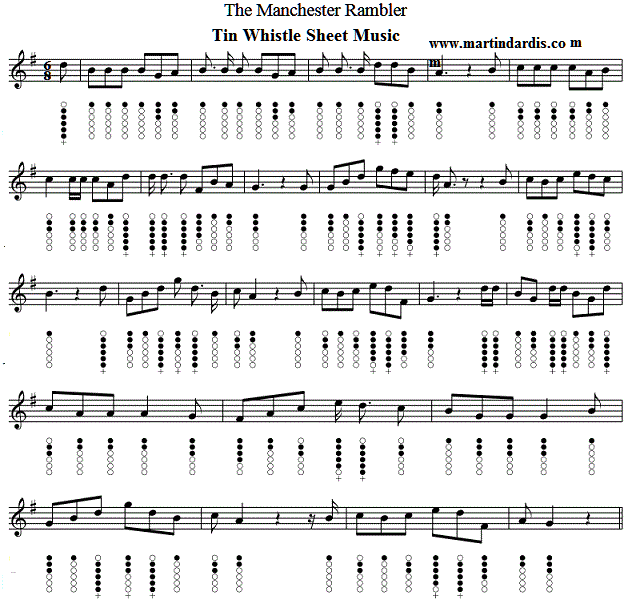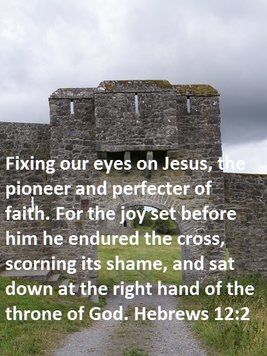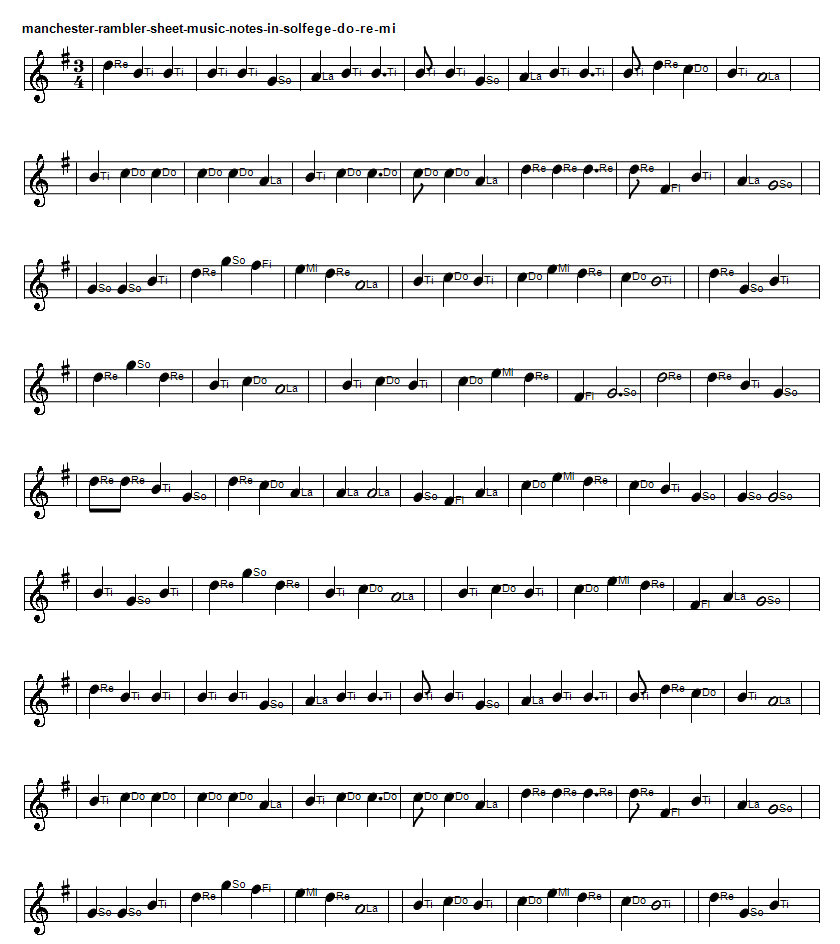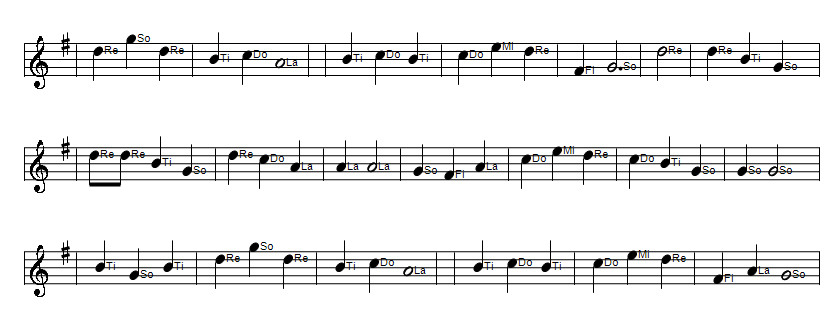The Manchester Ramblers Lyrics AndChords
The Manchester Rambler Sheet Music For The Tin Whistle is included for this old folk song by The Dubliners. Written by Ewan McColl with the chorus added later by John Tams. A song about the rights to ramble on land that's not your own, although this song was written in 1932 the subject is still a hot topic almost eighty years later in Britain. Also,The Manchester rambler sheet music notes in do re mi solfege now added. Ewan MacColl changed the last line of the chorus to "I have my freedom on Sunday," in response to a complaint from a woman friend. Back to The Dubliners Song Lyrics
[C]I've been over Snowden, I've slept upon Crowden
I've camped by the Wainstones as [G]well
I've sunbathed on Kinder, been burned to a cinder
And many more things I can [C]tell
[C]My rucksack has oft been me [G]pillow
The heather has oft been me [C]bed
And sooner than part from the [G]mountains
I think I would rather be [C]dead
Ch: [C]I'm a rambler, I'm a rambler from [G]Manchester way
I get all me pleasure the [C]hard moorland way
I may be a wageslave on[G] Monday
But I am a free man on[C] Sunday
The day was just ending and I was descending
Down Grindsbrook just by Upper Tor
When a voice cried "Hey you" in the way keepers do
He'd the worst face that ever I saw
The things that he said were unpleasant
In the teeth of his fury I said
"Sooner than part from the mountains
I think I would rather be dead"
He called me a louse and said "Think of the grouse"
Well i thought, but I still couldn't see
Why all Kinder Scout and the moors roundabout
Couldn't take both the poor grouse and me
He said "All this land is my master's"
At that I stood shaking my head
No man has the right to own mountains
Any more than the deep ocean bed
I once loved a maid, a spot welder by trade
She was fair as the Rowan in bloom
And the bloom of her eye watched the blue Moreland sky
I wooed her from April to June
On the day that we should have been married
I went for a ramble instead
For sooner than part from the mountains
I think I would rather be dead
So I'll walk where I will over mountain and hill
And I'll lie where the bracken is deep
I belong to the mountains, the clear running fountains
Where the grey rocks lie ragged and steep
I've seen the white hare in the gullys
And the curlew fly high overhead
And sooner than part from the mountains
I think I would rather be dead
I've camped by the Wainstones as [G]well
I've sunbathed on Kinder, been burned to a cinder
And many more things I can [C]tell
[C]My rucksack has oft been me [G]pillow
The heather has oft been me [C]bed
And sooner than part from the [G]mountains
I think I would rather be [C]dead
Ch: [C]I'm a rambler, I'm a rambler from [G]Manchester way
I get all me pleasure the [C]hard moorland way
I may be a wageslave on[G] Monday
But I am a free man on[C] Sunday
The day was just ending and I was descending
Down Grindsbrook just by Upper Tor
When a voice cried "Hey you" in the way keepers do
He'd the worst face that ever I saw
The things that he said were unpleasant
In the teeth of his fury I said
"Sooner than part from the mountains
I think I would rather be dead"
He called me a louse and said "Think of the grouse"
Well i thought, but I still couldn't see
Why all Kinder Scout and the moors roundabout
Couldn't take both the poor grouse and me
He said "All this land is my master's"
At that I stood shaking my head
No man has the right to own mountains
Any more than the deep ocean bed
I once loved a maid, a spot welder by trade
She was fair as the Rowan in bloom
And the bloom of her eye watched the blue Moreland sky
I wooed her from April to June
On the day that we should have been married
I went for a ramble instead
For sooner than part from the mountains
I think I would rather be dead
So I'll walk where I will over mountain and hill
And I'll lie where the bracken is deep
I belong to the mountains, the clear running fountains
Where the grey rocks lie ragged and steep
I've seen the white hare in the gullys
And the curlew fly high overhead
And sooner than part from the mountains
I think I would rather be dead
Alternative guitar chords in the key of G.
[G]I've been over Snowden, I've slept upon Crowden
I've camped by the Wainstones as [D]well
I've sunbathed on Kinder, been burned to a cinder
And many more things I can [G]tell
[G]My rucksack has oft been me [D]pillow
The heather has oft been me [G]bed
And sooner than part from the [D]mountains
I think I would rather be [G]dead
Ch: [G]I'm a rambler, I'm a rambler from [D]Manchester way
I get all me pleasure the [G]hard moorland way
I may be a wageslave on[D] Monday
But I am a free man on[G] Sunday
[G]I've been over Snowden, I've slept upon Crowden
I've camped by the Wainstones as [D]well
I've sunbathed on Kinder, been burned to a cinder
And many more things I can [G]tell
[G]My rucksack has oft been me [D]pillow
The heather has oft been me [G]bed
And sooner than part from the [D]mountains
I think I would rather be [G]dead
Ch: [G]I'm a rambler, I'm a rambler from [D]Manchester way
I get all me pleasure the [G]hard moorland way
I may be a wageslave on[D] Monday
But I am a free man on[G] Sunday
The Manchester Ramblers, also known as the Manchester Area Ramblers’ Association (MARA), is a hiking club based in Manchester, England. Founded in 1903, the club has a long and rich history of promoting and preserving the natural beauty of the British countryside, while also encouraging the physical and mental benefits of outdoor activities. Over the years, the Manchester Ramblers have played a significant role in shaping the landscape of hiking and walking in the UK, and their impact on the outdoor community is still evident today.
The origins of the Manchester Ramblers can be traced back to the late 19th century when there was a growing interest in hiking and rambling among the working-class population of Manchester. This interest was largely fueled by the emerging industrialization and urbanization, which led many people to seek refuge in the countryside and escape the polluted and congested city life. The lack of green spaces and access to nature in the city also played a significant role in the popularity of hiking and walking as a recreational activity.
In 1894, the National Trust for Places of Historic Interest or Natural Beauty (now known as the National Trust) was founded, with the aim of preserving the natural and historic sites of England, Wales, and Northern Ireland. This sparked a new wave of interest in hiking and walking, as people became more aware of the importance of protecting the countryside. It was in this context that the Manchester Ramblers was formed, as a means of bringing together like-minded individuals who shared a passion for the outdoors and a desire to protect it.
The early years of the Manchester Ramblers were marked by a series of organized walks and outings, which were open to all members of the public. The club also published a monthly journal, ‘The Rambling Annual’, which contained information on the latest walks and routes, as well as articles on the importance of preserving the countryside. The club quickly gained popularity, and by 1910, it had over 500 members.
One of the defining moments in the history of the Manchester Ramblers came in 1932 when the club joined forces with other rambling clubs from across the country to form the Ramblers’ Association. This was a significant step towards the protection and promotion of the rights of access to the countryside. With the passing of the National Parks and Access to the Countryside Act in 1949, the Ramblers’ Association, with the support of the Manchester Ramblers, successfully campaigned for the establishment of national parks and the creation of a ‘right to roam’ in the UK.
The Manchester Ramblers also played a crucial role in the formation of the Peak District National Park, which was the first national park in the UK. In the 1920s, the club campaigned for the preservation of the Peak District and its designation as a national park. This was achieved in 1951, with the Peak District becoming a national park, covering an area of 555 square miles, including parts of Derbyshire, Cheshire, Staffordshire, and Yorkshire.
The club’s involvement in the creation of national parks and the ‘right to roam’ not only helped to protect the countryside but also opened up new opportunities for outdoor activities. The Manchester Ramblers have since organized countless walks and hikes in the Peak District and other national parks, providing people with a chance to experience the beauty of the British countryside.
The Manchester Ramblers have also been involved in various conservation projects, working closely with organizations such as the National Trust, the Woodland Trust, and the Wildlife Trust. In recent years, the club has focused on initiatives such as maintaining and improving footpaths, preserving and restoring natural habitats, and organizing litter clean-ups to protect the environment.
Apart from their contributions to preserving the countryside, the Manchester Ramblers have also played a significant role in promoting the physical and mental benefits of hiking and walking. The club has always been open to people of all ages and abilities, and their organized walks provide a welcoming and inclusive environment for everyone to enjoy the outdoors. The club has also been involved in raising awareness about mental health and the positive impact of being in nature, with many members citing walking as a form of therapy.
In conclusion, the Manchester Ramblers have a rich history that spans over a century, and their impact on the outdoor community cannot be underestimated. From their humble beginnings as a hiking club in Manchester to their involvement in the establishment of national parks and the ‘right to roam’ in the UK, the Manchester Ramblers have been at the forefront of promoting and preserving the natural beauty of the British countryside. The club’s commitment to conservation, their inclusive approach, and their promotion of the physical and mental benefits of hiking and walking have made them an important and beloved institution in the UK’s outdoor community.
The origins of the Manchester Ramblers can be traced back to the late 19th century when there was a growing interest in hiking and rambling among the working-class population of Manchester. This interest was largely fueled by the emerging industrialization and urbanization, which led many people to seek refuge in the countryside and escape the polluted and congested city life. The lack of green spaces and access to nature in the city also played a significant role in the popularity of hiking and walking as a recreational activity.
In 1894, the National Trust for Places of Historic Interest or Natural Beauty (now known as the National Trust) was founded, with the aim of preserving the natural and historic sites of England, Wales, and Northern Ireland. This sparked a new wave of interest in hiking and walking, as people became more aware of the importance of protecting the countryside. It was in this context that the Manchester Ramblers was formed, as a means of bringing together like-minded individuals who shared a passion for the outdoors and a desire to protect it.
The early years of the Manchester Ramblers were marked by a series of organized walks and outings, which were open to all members of the public. The club also published a monthly journal, ‘The Rambling Annual’, which contained information on the latest walks and routes, as well as articles on the importance of preserving the countryside. The club quickly gained popularity, and by 1910, it had over 500 members.
One of the defining moments in the history of the Manchester Ramblers came in 1932 when the club joined forces with other rambling clubs from across the country to form the Ramblers’ Association. This was a significant step towards the protection and promotion of the rights of access to the countryside. With the passing of the National Parks and Access to the Countryside Act in 1949, the Ramblers’ Association, with the support of the Manchester Ramblers, successfully campaigned for the establishment of national parks and the creation of a ‘right to roam’ in the UK.
The Manchester Ramblers also played a crucial role in the formation of the Peak District National Park, which was the first national park in the UK. In the 1920s, the club campaigned for the preservation of the Peak District and its designation as a national park. This was achieved in 1951, with the Peak District becoming a national park, covering an area of 555 square miles, including parts of Derbyshire, Cheshire, Staffordshire, and Yorkshire.
The club’s involvement in the creation of national parks and the ‘right to roam’ not only helped to protect the countryside but also opened up new opportunities for outdoor activities. The Manchester Ramblers have since organized countless walks and hikes in the Peak District and other national parks, providing people with a chance to experience the beauty of the British countryside.
The Manchester Ramblers have also been involved in various conservation projects, working closely with organizations such as the National Trust, the Woodland Trust, and the Wildlife Trust. In recent years, the club has focused on initiatives such as maintaining and improving footpaths, preserving and restoring natural habitats, and organizing litter clean-ups to protect the environment.
Apart from their contributions to preserving the countryside, the Manchester Ramblers have also played a significant role in promoting the physical and mental benefits of hiking and walking. The club has always been open to people of all ages and abilities, and their organized walks provide a welcoming and inclusive environment for everyone to enjoy the outdoors. The club has also been involved in raising awareness about mental health and the positive impact of being in nature, with many members citing walking as a form of therapy.
In conclusion, the Manchester Ramblers have a rich history that spans over a century, and their impact on the outdoor community cannot be underestimated. From their humble beginnings as a hiking club in Manchester to their involvement in the establishment of national parks and the ‘right to roam’ in the UK, the Manchester Ramblers have been at the forefront of promoting and preserving the natural beauty of the British countryside. The club’s commitment to conservation, their inclusive approach, and their promotion of the physical and mental benefits of hiking and walking have made them an important and beloved institution in the UK’s outdoor community.
The Manchester rambler sheet music notes in do re mi solfege





